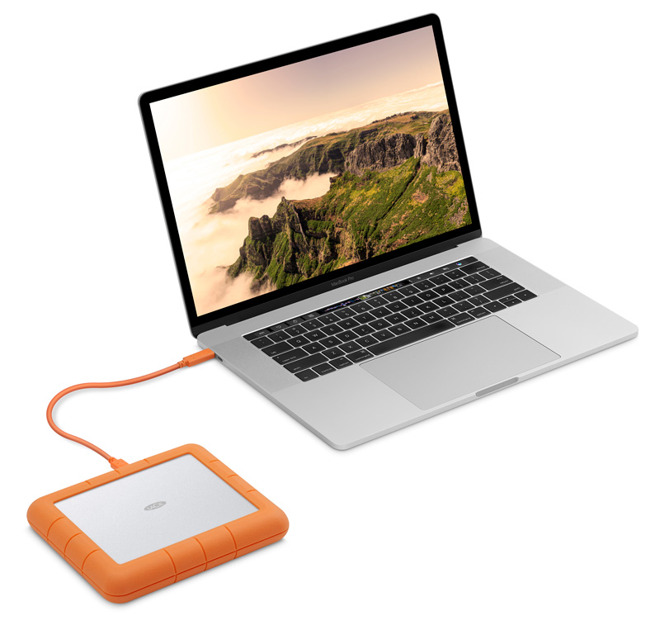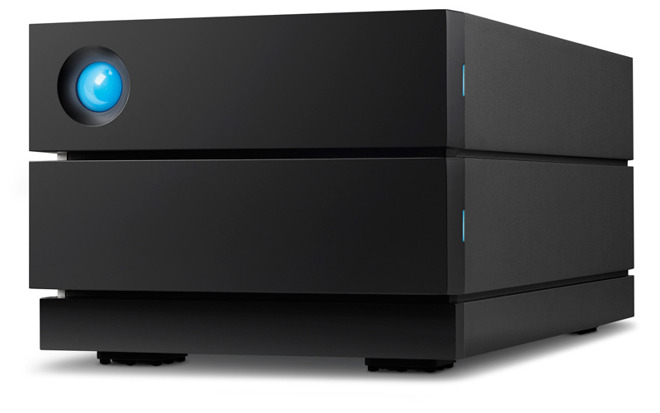LaCie announces USB-C 2big RAID & 8-terabyte Rugged RAID Shuttle
Storage maker LaCie is launching two new pro-oriented RAID products, the Rugged RAID Shuttle and the 2big RAID, both featuring USB-C connectivity.

The Rugged RAID Shuttle is portable model available in a single 8 terabyte capacity, and can operate in either RAID 0 or 1, the former for maximum performance and the latter for redundancy. In RAID 0 it offers speeds up to 250 megabytes per second.
While it connects to both Thunderbolt 3 and USB-C, port speeds are limited to the 5 gigabits per second of USB 3.1 Gen 1. Both Thunderbolt/USB-C and USB-C-to-USB-A cables are included in the box.
The unit is surrounded by an orange rubber shell helping to protect against drops up to 4 feet. The layer also aids the drive's IP54 rating against water and dust.
The stationary 2big RAID comes pre-formatted for exFAT, and can operate at much faster speeds, up to 440 megabytes per second. Its Thunderbolt 3/USB-C port offers USB 3.1 Gen 2 bandwidth up to 10 gigabits per second.

The 2big RAID is shipping later this month in 4-, 8-, and 16-terabyte capacities, costing $419, $529, and $739, respectively. The Rugged RAID Shuttle is due in May for $529.99.

The Rugged RAID Shuttle is portable model available in a single 8 terabyte capacity, and can operate in either RAID 0 or 1, the former for maximum performance and the latter for redundancy. In RAID 0 it offers speeds up to 250 megabytes per second.
While it connects to both Thunderbolt 3 and USB-C, port speeds are limited to the 5 gigabits per second of USB 3.1 Gen 1. Both Thunderbolt/USB-C and USB-C-to-USB-A cables are included in the box.
The unit is surrounded by an orange rubber shell helping to protect against drops up to 4 feet. The layer also aids the drive's IP54 rating against water and dust.
The stationary 2big RAID comes pre-formatted for exFAT, and can operate at much faster speeds, up to 440 megabytes per second. Its Thunderbolt 3/USB-C port offers USB 3.1 Gen 2 bandwidth up to 10 gigabits per second.

The 2big RAID is shipping later this month in 4-, 8-, and 16-terabyte capacities, costing $419, $529, and $739, respectively. The Rugged RAID Shuttle is due in May for $529.99.

Comments
Apple's Fusion (hybrid) design is a very traditional caching strategy. All caching strategies are based on a statistically affirmed knowledge of how data is referenced by running programs in time and/or space and where a natural bottleneck exists, which for nearly all computing platforms based on Von Neumann architecture is memory, backing storage, and caching hierarchies. In other words, programs tend to make multiple memory requests for data that was recently requested and/or memory locations adjacent to ones that have already been referenced. This is a very different strategy than what is driving the design of RAID systems.
I understand the notion of adaptive processing, say what you’d implement for load balancing, elasticity, scalability, etc. But again, if that’s the purposeful objective that’s driving the design strategy why mix in a design like RAID that was driven an entirely different purpose, much less two different types of RAID that serve two different purposes? Dynamically reconfiguring a storage element on the fly from one RAID strategy whose purpose is performance to another RAID strategy whose purpose is fault tolerance based on data access patterns or storage demand would be very confusing to say the least. At what point would the user or client know that the underlying rules of the game were changed - whether they like the change or not? As a client or consumer I always want to know that the contract that I signed up for is adhered to in a deterministic manner over the life of the contract. Every RAID strategy comes with an implied “contract” between client and provider.